Choosing the right keywords is the key to increasing the visibility of your website and driving the right users to that. Good keyword research can boost your organic traffic by 80%+. Here, I reveal to you the full step-by-step process and how to choose the best keywords for your website that suit both user intent and the algorithm of search engines.
Explaining Why You Need to do Keyword Research
First and foremost, keyword research runs the engine on a better SEO campaign. It consists of the terms and phrases that potential customers use when searching for anything related to your business. Once you know those search queries, you can produce content that satisfies their search and ranks top in search engine results. Lack of research on keywords only robbed you of some opportunities and lessened your presence on the web.
How to Choose the Best Keywords for Your Website
Here we will discuss some useful techniques that will help you to pick the cleanest keywords with the best SEO performance for your website..
1 Target Your Niche and Audience
The first step is to know your business segment and what specific audience you want. Reflect on what products or services you provide and the painpoints they address. This clarity will help you isolate some search terms potential customers may be looking for.

2. Brainstorm Seed Keywords
Seed keywords are core terms related to your business. Like, if you do a digital marketing agency then seed keywords would be something like “digital marketing”, “SEO” or “online advertising” This initial step leads to further exploration of keywords.

3. Keyword Research Tools
Use the keyword research tools to get new potential keywords that you can add to your list:
- Google Keyword Planner (Free Tool that shows keyword ideas and traffic) and Traffic Stats.
- Ahrefs: Features full keyword research — how many searches per month, the difficulty of that keyword, and competitive analysis.
- SEMrush: Offers views of competitor keywords and full SEO reports. 3

These tools help you to find long-tailed keywords — specific phrases with low competition but high search intent.
4. Search Analyser
We Need to Understand Why the User is Entering This Search Word/Phrase. Search Intent is separated into four common categories:

- Short-tail keywords – Broad and competitive (e.g., “digital marketing”)
- Long-tail keywords – More specific and easier to rank for (e.g., “best digital marketing strategies for small businesses”)
- Informational keywords – Users are looking for knowledge (e.g., “how to start a blog”)
- Navigational Keywords: Going to a specific site (i.e., “Facebook login”).
- Transactional keywords – People are ready to buy (e.g., “buy running shoes online”)
- Commercial Keywords: Investigating products or services (e.g., “the best cameras of 2025 “)
Align your keywords with the right search intent for real results.
Also read this Blog: How Backlinks are Important for SEO
5. Evaluate Keyword Metrics
Consider the following for potential keywords:
- SEARCH VOLUME: This is the number of searches the keyword gets each month.
- Keyword Difficulty: How Hard It Is To Rank for a Given Keyword.
- Cost Per Click (CPC) is The Average Spending on an Ad that is clicked for the keyword.

Balancing these metrics helps you identify the keywords that are reachable and valuable.
6. Analyze Competitor Keywords
Look at which keywords your competitors are beating down with. If so, this analysis can show wonderful insight into your strategy holes and potential keywords that their left behind. This competitive analysis can be done with software such as SEMrush or Ahrefs.

7. Sequencing and Clustering Your Keywords
Then narrow it down with a clean-cut list of each keyword you should target (most relevant > highest search/currency). Add them into categories or topics, get your content creation in order and so that you are not missing out on topics.

8. Track and tweak your keywords
SEO is forever For monitoring your keywords, you will be updated frequently to prevent adjusting your strategy. The trend is not constant and updating helps in making the content relevant.

Additional Resources
For additional help with keyword research and SEO techniques, seek out the services of a digital marketing freelancer or engage an SEO professional. Numerous professionals will provide free consultations for you to outline your needs and objectives.
There is a free consultation where you can get some personalized insights and it can help to optimize the way how to choose the keywords.
Conclusion
Keywords are critical since it’s an SEO STRATEGY and picking the right keywords for your website Choosing the right keywords is the best part of SEO. Learning everything you can at once prevents you from feeling overwhelmed and allows you to change your website to exposure better see some organic traffic. Keep in mind that keyword research is not something that should be performed only one time, but it evolves based on changing trends and human behaviors.
Start right, grab a free keyword research template, and get the ball rolling for better SEO next time.














